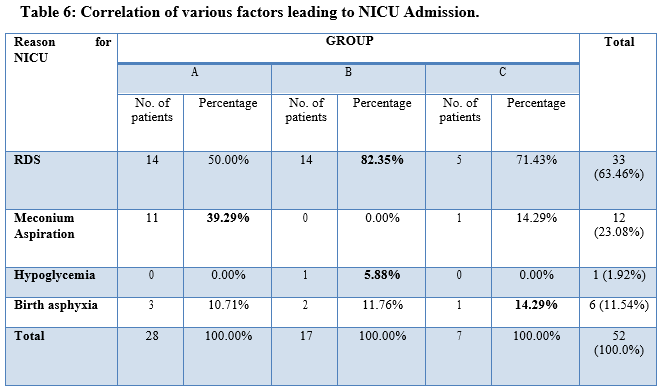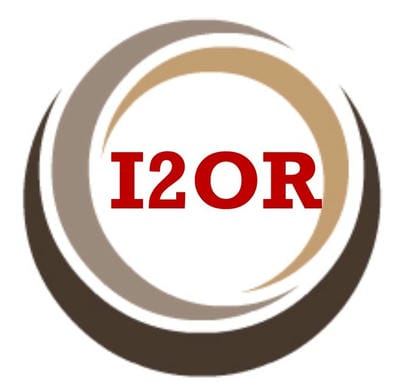A study of Maternal BMI as Determinant of Pregnancy & Perinatal Outcomes in Hazaribagh Medical College and Hospital, Hazaribagh.
Abstract
Introduction: Maternal nutrition plays an important role in maternal and fetal outcomes. The low maternal BMI or Obesity are both associated with adverse outcomes.
Objectives: To evaluate the impact of the maternal body mass index on the pregnancy outcome and neonatal outcomes.
Materials and Methods: This is a prospective cohort study in which a total of 200 patients meeting the inclusion criteria were enrolled in the study after informed consent of which 100 patients enrolled after 18 weeks of gestation had a low BMI and 100 patients with a higher BMI than normal.
Results: Pregnant females having low BMI as baseline had more risk of IUGR, fetal distress and low birth weight in newborns while those having high maternal BMI had more incidence of PIH in mothers, oligohydramnios, increased birth weight, increased risk of LSCS and NICU admissions and delayed maternal wound healing.
Conclusion: The health of women, throughout their childbearing ages, should be cared , to improve their obstetrical and perinatal outcomes. Also, the high-risk groups should be managed properly.
Downloads
References
Park K. Park’s Textbook of Preventive and Social Medicine. 24th ed. Aniridias Bhanot;2015:397.
Kim SY, Dietz PM, England L, Morrow B, Callaghan WM. Trends in pre-pregnancy obesity in nine states 1993–2003. Obesity 2007;15:986-93.
Frederick IO, Williams MA, Sales AE, Martin DP, Killeen M. Prepreg Nancy body mass index, gestational weight gain, and other maternal characteristics in relation to infant birth weight. Maternal Child Health J. 2008;12:557-67.
Riz AM, Laraia B. The implications of maternal overweight and obesity on the course of pregnancy and birth outcomes. Matern Child Health J. 2006;10(5):153-6.
Andreasen KR, Andersen ML, Schantz AL. Obesity, and pregnancy. Acta Obstet Gynecol Scand. 2004;83(11):1022-9.
Guelinckx I, Devlieger R, Beckers K, Vansant G. Maternal obesity: pregnancy complications, gestational weight gain and nutrition. Obes Rev. 2008; 9(2):140-50.
Heslehurst N, Simpson H, Ells LJ, Rankin J, Wilkinson J, Lang R, et al. The impact of maternal BMI status on pregnancy outcomes with immediate short-term obstetric resource implications: a meta- analysis. Obes Rev. 2008;9(6):635-83.
Mendez MA, Monteiro CA, Popkin BM. Overweight exceeds underweight among women in most developing countries. Am J Clin Nutr. 2005;81:714-21.
Balarajan Y, Villamor E. Nationally representative surveys show recent increases in the prevalence of overweight and obesity among women of reproductive age in Bangladesh, Nepal, and India. J Nutr. 2009;139:2139-44.
Sahu MT, Agarwal A, Das V, Pandey A. Impact of maternal body mass index on obstetric outcome. J Obstet Gynaecol Res. 2007;33(5):655-9.
Abenhaim HA, Kinch RA, Morin L, Benjamin A, Usher R. Effect of pre- pregnancy body mass index categories on obstetrical and neonatal outcomes. Arch Gynecol Obstet. 2007;275(1):39-43.
International Institute for population sciences. Key Indicators for India from NFHS-3. 2006.
Sahu MT, et al. The impact of the maternal body mass index on the obstetric outcome. J Obstet Gynaecol Res. 2007 Oct; 33(5):655–59.
Bhattacharya S, et al. The effect of the body mass index on the pregnancy outcomes in nulliparous women who delivered singleton babies. BMC Public Health.2007;7:168. doi; 10. 1186/1471- 2458-7-168.
Ehrenberg HM, Dierker LRN, Milluzzi C, Mercer BM. Low maternal weight failure to thrive in pregnancy and adverse prenatal outcomes. Am J Obstet Gynecol.2003;189:1726–30.
Van der Steeg JW, Steures P, Eijkemans MJ. Obesity affects spontaneous pregnancy chances in subfertile, ovulatory women. Hum Reprod. 2008;23:324–328.
Kim SS, Zhu Y, Grantz KL, et al. Obstetric and neonatal risks among obese women without chronic disease. Obstet Gynecol.2016;128:104–112.
Is maternal underweight really a risk factor for adverse pregnancy outcome? A population-based study in London N.J. Sebirea, M. Jollya, J. Harrisb, Regana L, S. Robinsonc British journal of Obstetrics and Gynaecology january 2001 volume 108 page 61-66.
Pre pregnancy body mass index, gestational weight gain, and other maternal characteristics in relation to infant birth weight Ihunnaya O Frederick, Michelle A Williams, Anne E Sales, Diane P Martin, Marcia Killien Maternal abd child health journal.2008;12 (5), 557- 567.
The effects of maternal body mass index on pregnancy outcome Ali S Khashan , Louise C Kenny European journal of epidemiology.2009;24(11):697.
Harding KL, Aguayo VM, Namirembe G, Webb P. Determinants of anaemia among women and children in Nepal and Pakistan: An analysis of recent national survey data. Matern Child Nutr. 2018 Nov;14 Suppl 4:e12478.
Strauss RS, Knight J. Influence of the home environment on the development of obesity in children. Pediatrics 1999;103:85.
Mamun AA, Callaway LK, O’Callaghan MJ, Williams GM, Najman JM. Associations of maternal pre-pregnancy obesity and excess pregnancy weight gains with adverse pregnancy outcomes and length of hospital stay. BMC Pregnancy Childbirth 2011;11:62.
Amanda Drake J, Rebecca Reynolds M.Impact of maternal obesity on offspring obesity and cardiometabolic disease risk. Society for Reproduction and Fertility.2010;140: 387–398.

Copyright (c) 2021 Author (s). Published by Siddharth Health Research and Social Welfare Society

This work is licensed under a Creative Commons Attribution 4.0 International License.


 OAI - Open Archives Initiative
OAI - Open Archives Initiative



















 Therapoid
Therapoid

